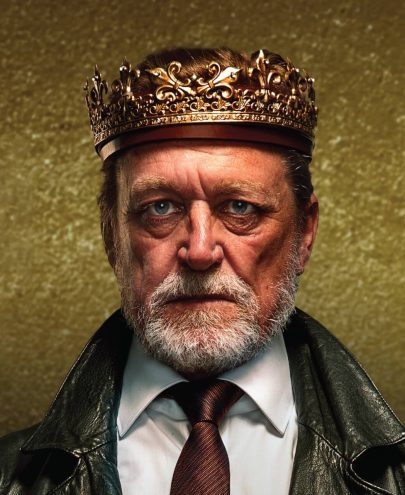Mar 12, 2015 Theatre
ASB Theatre, Aotea Centre
The nasty way to introduce you to Third World Bunfight’s Macbeth would be with the text message. I almost wish I liked this opera less, because for the hostile critic it’s a bonanza. So many easy cheap shots. Look, let’s stipulate that I am not a hostile critic, and start with the text message anyway, okay? Too good to miss.
“Babe. Met witches in the forest. Said I will be king. WTF !!? C u lata. xxM”.
So much punchier than Shakespeare’s “When I burned in desire to question them further, they made themselves air, into which they vanished.” We see the message projected on a screen to the rear of the stage while Lady Macbeth peers in wonder at her phone. (Between the screen, the center-stage corrugated iron podium on which most of the action takes place, the chorus, facing the audience to the left, the orchestra, opposite the chorus to the right, and the surtitle screens overhead, there are five significant areas to keep track of in this production. Mostly this equates to vibrant/dynamic; sometimes it becomes too busy.)
We’re meant to laugh at the text message, and my audience did. It’s the deliberate extreme instance of writer-designer-director Brett Bailey’s use of the demotic. Usually he deploys it to grimmer and more powerful effect, as with Macbeth’s opening line, uttered in the wake of a costly but victorious battle: “A fucking horrible beautiful day.” This would tell us that we’re not watching grandad’s Shakespeare, except that the overture has already let us know we’re not listening to grandad’s Verdi. From the first high ominous tremolo notes of composer-adapter Fabrizio Cassol’s score, it’s dramatically clear that we’re listening to 21st century music.
But then, imperceptibly, we’re not: Cassol shades us back into Verdi. Throughout the opera, a varied modern soundscape – African drum rhythms, harsh roaring dissonance, hushed moments of eery horror movie score – coexists with nineteenth century auditory propriety. Meanwhile, Bailey’s libretto is combining the poetry of rap with the poetry of rapture. One moment Lady Macbeth is singing, “Let darkness take root in this house. Let its foliage hide what we do”. The next, Macbeth is rejecting his vision of the floating dagger: “It’s all bullshit.”
Bullshit? Some will adore it: an irreverent eloquence which takes no prisoners and considers nothing stylistically off limits. Others may find the eclecticism self-damaging; certainly there are moments when an abrupt switch of register – musical or verbal – is jarring.
Bailey wants us jarred. At the macro level, he’s worked two major changes on Verdi’s version of the Shakespeare story: edited the hell out of it, cutting major characters and scenes until a three hour story whips by in less than two, and transposed it to the contemporary Congo, turning the witches into depraved multinational reps with a resource extraction agenda and Macbeth into a genocidal warlord. This is not tragedy at a safe distance. In an early scene, a menacing thug drags a chorus member off and rapes her. The constant narrative shifts and jumps of mood are a way of saying that we’re sitting on the fringes of a world in the process of collapsing.
Repurposing someone else’s story inevitably involves losses as well as gains; the logic of Lady Macbeth’s insanity and death, for instance, becomes threadbare in this telling. Other moments, such as Macduff’s reaction to his family’s slaughter, gain immense power from Bailey’s reframing. Overall, the production gains far more than it loses, and the singing – especially Nobulumko Mngxekeza’s, as Lady Macbeth – is top drawer.
The Aotea Center’s ASB theatre was a long way from full last night. Well, it’s festival time, there’s a lot to choose from. But this has got to be one of the best shows on offer right now, and it’s only playing four times. Get out and see it before you lose your chance.
https://www.youtube.com/watch?v=BlWHVm94sdo
Macbeth: ASB Theatre until March 15. aucklandfestival.co.nz





